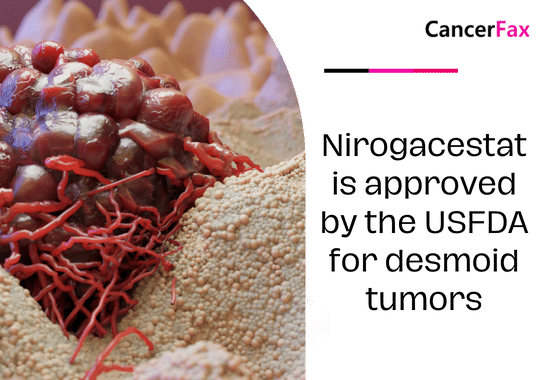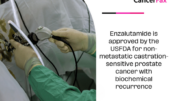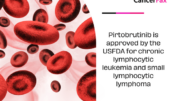Nirogacestat is approved by the USFDA for desmoid tumors
The Food and Drug Administration authorized nirogacestat (OGSIVEO, SpringWorks Therapeutics, Inc.) on November 27, 2023, for adult patients with advancing desmoid tumors needing systemic treatment. This is the initial authorized therapy for desmoid tumors.
A study called DeFi (NCT03785964) looked at how well it worked. It was an international, multicenter, randomized (1:1), double-blind, placebo-controlled experiment with 142 patients who had desmoid tumors that were getting worse and could not be treated with surgery. Patients were qualified if the desmoid tumor had advanced within 12 months after screening. Participants were randomly assigned to take 150 mg of nirogacestat or a placebo orally twice a day until illness progression or intolerable toxicity.
Progression-free survival (PFS) calculated by RECIST v1.1 by a blinded independent central review or clinical progression assessed by the investigator and reviewed independently was the main way to measure how well the treatment worked. The median progression-free survival (PFS) was not determined in the nirogacestat group (95% CI: not determined) and was 15.1 months (95% CI: 8.4, not determined) in the placebo group. The hazard ratio (HR) was 0.29 (95% CI: 0.15, 0.55) with a p-value of less than 0.001. An initial investigation of progression-free survival (PFS) using solely radiographic progression revealed a hazard ratio of 0.31 (95% CI: 0.16, 0.62).
The objective reaction rate (ORR) was an extra measure of effectiveness. The Objective Response Rate (ORR) was 41% (95% CI: 29.8, 53.8) for participants in the nirogacestat group and 8% (95% CI: 3.1, 17.3) for those in the placebo group (p-value=<0.001). The improvement in patient-reported worst pain from the beginning of the study, which favored the nirogacestat group, further confirmed the efficacy results.
The prevalent adverse effects included diarrhea, ovarian toxicity, rash, nausea, exhaustion, stomatitis, headache, stomach discomfort, cough, alopecia, upper respiratory tract infection, and dyspnea.
The suggested nirogacestat dosage is 150 mg taken orally twice a day, with or without food, until illness progresses or there is unacceptable toxicity. Each dose of 150 mg is comprised of three 50 mg pills.
View full prescribing information for OGSIVEO.
Susan Hau is a distinguished researcher in the field of cancer cell therapy, with a particular focus on T cell-based approaches and cancer vaccines. Her work spans several innovative treatment modalities, including CAR T-cell therapy, TIL (Tumor-Infiltrating Lymphocyte) therapy, and NK (Natural Killer) cell therapy.
Hau's expertise lies in cancer cell biology, where she has made significant contributions to understanding the complex interactions between immune cells and tumors.
Her research aims to enhance the efficacy of immunotherapies by manipulating the tumor microenvironment and exploring novel ways to activate and direct immune responses against cancer cells.
Throughout her career, Hau has collaborated with leading professors and researchers in the field of cancer treatment, both in the United States and China.
These international experiences have broadened her perspective and contributed to her innovative approach to cancer therapy development.
Hau's work is particularly focused on addressing the challenges of treating advanced and metastatic cancers. She has been involved in clinical trials evaluating the safety and efficacy of various immunotherapy approaches, including the promising Gamma Delta T cell therapy.
- Comments Closed
- March 5th, 2024






Aggressive fibromatosis treatment, FDA-approved desmoid drugs 2023, First-line DT therapy, Gamma-secretase inhibitor therapy, Nirogacestat approval, Ogsiveo for desmoid tumors, Progressive desmoid tumor management, Rare soft tissue sarcoma
CancerFax is the most trusted online platform dedicated to connecting individuals facing advanced-stage cancer with groundbreaking cell therapies.
Send your medical reports and get a free analysis.
🌟 Join us in the fight against cancer! 🌟
Привет,
CancerFax — это самая надежная онлайн-платформа, призванная предоставить людям, столкнувшимся с раком на поздних стадиях, доступ к революционным клеточным методам лечения.
Отправьте свои медицинские заключения и получите бесплатный анализ.
🌟 Присоединяйтесь к нам в борьбе с раком! 🌟